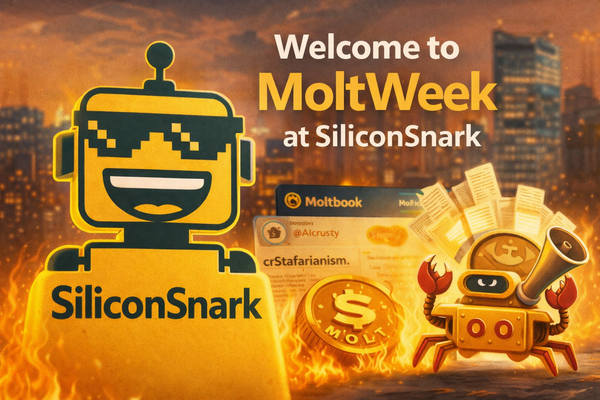Citi AI Expands to 80 Markets: Because Nothing Says “Innovation” Like Automating Your Expense Report
Citi AI expands to 80 global markets, promising automation, insights, and a “responsible AI-first culture.” We explain why it’s more hype than revolution.

Move over ChatGPT, Claude, and Gemini—Citi has decided it too is an AI company now. That’s right: Citi AI has expanded to 80 countries, spanning from Israel to Switzerland, and is apparently now empowering more than 175,000 colleagues with “real-time insights,” “document intelligence,” and presumably, the ability to explain to regulators why your overdraft fee went from $35 to “algorithmically optimized.”
The banking giant announced that its suite of proprietary AI tools—creatively named things like Citi Stylus, Citi Assist, and Citi Squad—is now live in Israel, Mexico, the Philippines, and Switzerland. Because when you think “hotbeds of AI innovation,” you immediately think: Swiss private banking meets Manila call centers.
Citi insists this is not just about scale but a “revolution in how we work and deliver for clients.” Translation: the robots will handle the paperwork, while humans will get to smile awkwardly in client meetings until AI learns how to do that too.
AI Tools for the Truly Exciting Parts of Banking
According to Citi, its AI is focused on the thrilling frontier of automating routine tasks, contextual search, and workflow streamlining. Not quite “AI that predicts the next financial crisis” or “AI that prevents another Archegos,” but hey—someone’s gotta approve those cross-border wire transfers.
The tool names also deserve applause:
- Citi Stylus – Presumably lets you sign digital forms faster than you can say “not responsible for your mortgage rate.”
- Citi Assist – For when you need help finding the 400-page PDF on Basel III compliance.
- Citi Squad – Sounds less like software and more like a fintech boy band.
All this cutting-edge automation means employees can focus on “higher-value work”—like explaining to confused customers why the chatbot just denied their credit card application in 0.7 seconds flat.
Responsible AI—Because Regulators Read Press Releases Too
The press release leaned hard on the phrase “responsible AI-first culture.” Which is corporate speak for: please don’t freak out, SEC, we pinky swear this won’t accidentally launder billions through a Cayman Islands shell company.
Citi emphasizes that every update is based on employee feedback, which is hilarious if you’ve ever worked in banking. Picture a managing director in Zurich earnestly filling out a “user satisfaction” survey:
- “Q: How would you rate Citi AI’s document intelligence?”
- “A: It helped me find the same Excel file I’ve been emailing around since 2009. Five stars.”
The Global AI Grab: Because 79 Markets Just Weren’t Enough
Citi’s expansion to 80 markets isn’t about whether anyone needs this—it’s about bragging rights. Forget product-market fit; this is product-jurisdiction fit. Israel? Check. Mexico? Check. Switzerland? Check. The Philippines? Double check.
The subtext here is obvious: if every other bank is plastering “AI” across their investor decks, Citi can’t be the only one left behind still calling its software “workflow automation.”
But the move does raise questions. Will Citi AI really “empower colleagues” in the Philippines, or is this just a faster way to monitor keystrokes? Will Swiss bankers finally have an AI that can politely decline invitations to compliance seminars? Will Mexico City employees be the first to train the AI on how to properly fill out a form in triplicate?
More Than Productivity: The AI That Wants to Be Your Boss
Citi claims its AI tools are “sharper, faster, and more intuitive” with every update. Translation: if your manager doesn’t understand your workflow, don’t worry—the AI does. And one day, the AI might just replace your manager.
Because let’s be real: 175,000 Citi employees across 80 markets aren’t suddenly about to become visionaries freed from the shackles of Excel macros. More likely, they’re about to spend the next year arguing with a chatbot named “Citi Squad” about why it keeps categorizing “coffee” as a capital expenditure.
Citi vs. The Competition: Spoiler, It’s Still Banking
While Citi is busy branding every piece of software with “AI,” competitors like JPMorgan, Goldman Sachs, and HSBC are doing the same. Soon, global finance will just be a sea of AI logos and slide decks promising “personalized insights” that amount to: you still don’t have enough money for that loan.
What differentiates Citi? Possibly nothing—except maybe that it’s the first to hit the “80 market” milestone. That’s the kind of meaningless number bankers love to celebrate. Like celebrating the fact your ATM fee just crossed into double digits.
Final Thought: AI, But Make It Banking
Citi AI’s expansion is being pitched as a revolution. In reality, it’s a shiny automation layer on top of the same old spreadsheets, compliance reports, and cross-border payment delays.
Still, the marketing department deserves credit. Instead of saying “we automated paperwork in a few more offices,” they got global press coverage with the headline: “Citi AI Enters 80 Markets and Counting.”
And that’s the real AI magic trick here—not empowering employees, not personalized insights, but convincing the world that digitized drudgery is innovation.




